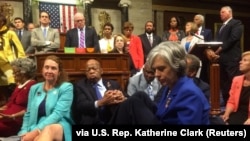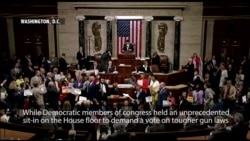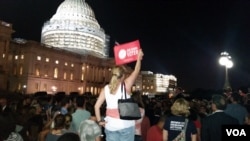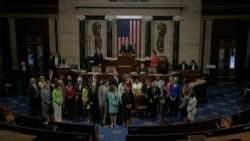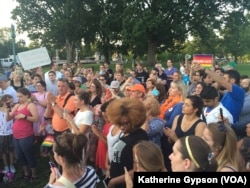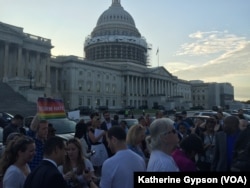The call went up from the House floor again and again - “No Bill. No Break.”
House Democrats going into the eleventh hour of a sit-in calling for gun control legislation heard House Speaker Paul Ryan was making his way to the floor and increased the chant they had repeated throughout a day of speeches calling for legislative action in response to the Orlando attack, the worst mass shooting in U.S. history.
Members of the public watching up in the galleries chanted back the lines that have trended on social media since earlier Wednesday, asking for the House of Representatives to vote on gun control legislation before leaving for the Independence Day holiday break.
Ryan could barely be heard calling for a vote as House Democrats chanted and waved a sea of white papers bearing the names of gun violence victims. They booed Ryan and called out, “Mr Speaker give us a vote.”
During the 15-minute vote, Rep. Ted Deutch called out to “My Republican friends,” but could not finish speaking as he was shouted down. Democrats responded by singing the Civil Rights anthem “We Shall Overcome” while Republicans looked on silently.
The chaotic vote capped an intense and unprecedented day on the House floor.
For a second consecutive week, Democrats in the U.S. Congress commandeered a chamber to demand action on gun violence that has shattered numerous American communities — most recently in Orlando, Florida.
House Democrats took to the floor en masse Wednesday, led by civil rights icon John Lewis of Georgia, and pledged to remain there in a "sit-in" until legislation is brought forward to stem carnage from firearms.
"Over the last 12 years, gun-related crimes claimed more American lives than AIDS, war and illegal drug overdoses combined," Lewis said in a letter to Republican House Speaker Paul Ryan announcing the protest. "We urge you to lead the House into action and work with both sides of the aisle to pass common sense solutions to keep American children and families safe."
Republicans initially responded with gavel-banging and demands for order on the floor. When Democrats refused to disperse, Republicans recessed the chamber and turned off the microphones. Although lights continued to shine, proceedings ceased to be televised, because video is fed from the chamber only when it is in session.
Democrats responded by launching their own broadcasts, using the mobile application Periscope on their cellular phones. A non-profit U.S. cable outfit that covers congressional proceedings (C-Span) began broadcasting the Periscope feeds.
Senators’ actions
Wednesday's House disruptions followed last week's action by Senate Democrats on the other side of the Capitol. Led by Chris Murphy of Connecticut, Democrats spoke on the Senate floor for 15 consecutive hours, at which point Republican Majority Leader Mitch McConnell agreed to bring gun control measures up for a vote.
On Wednesday, several senators walked across the Capitol to join their House colleagues in a show of support.
Lewis' participation brought poignancy and historical gravitas to the House protest. An African-American, Lewis took part in the 1965 civil rights march from Selma, Alabama, that came to be known as "Bloody Sunday" when state troopers attacked with clubs and tear gas. Lewis suffered a wound to his head.
Lewis and others used sit-ins to great effect in the 1960s to protest racial segregation at lunch counters and public facilities.
Republicans’ responses
On Wednesday, some House Republicans responded to the Democratic protest with derision.
"Calling this a sit-in is a disgrace to [protests at] Woolworth's [lunch counters]," tweeted Rep. Mark Walker of North Carolina, adding that the sit-ins of the past pressed for expanded civil rights, while Democrats want to "strip [gun rights] away."
Rep. Steven Russell of Oklahoma told VOA the Democrats' action amounted to grandstanding and "absolute theatrics."
"I'm really disappointed that that's what our institutions are eroding to," Russell said. "I think we can do better."
The sit-in drew attention from Speaker Ryan's long-awaited unveiling of a Republican alternative to President Barack Obama's signature domestic legislative achievement, the Affordable Care Act, also known as Obamacare. Ryan was away from the Capitol for much of the day, rolling out the Republican proposal at a Washington public policy research institute.
VOA's Katherine Gypson contributed to this report.




